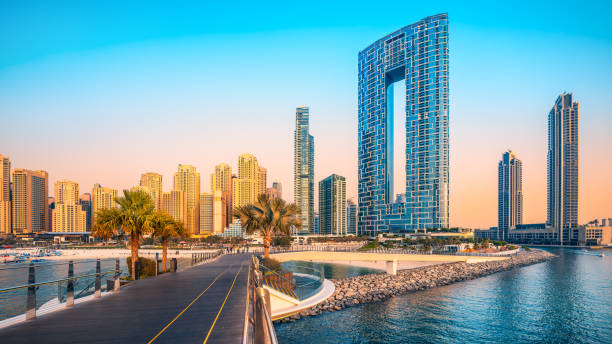The UAE tax system, especially in Dubai, is known for its investor-friendly policies and tax advantages. With no personal income tax and minimal corporate taxes, it stands out as a favorable destination for businesses and expatriates. However, with the introduction of corporate taxes, it is important for businesses to understand the UAE corporate tax registration process. This article delves into various aspects of Dubai’s taxation, including personal and corporate taxation, tax compliance regulations, and incentives offered to foreign investors. Through a structured approach, we aim to provide a comprehensive overview of how taxation works in Dubai, UAE, and what the future holds for its tax system.
Introduction to UAE Tax System
Dubai, part of the United Arab Emirates (UAE), boasts a unique and strategic tax system designed to stimulate economic growth and attract global businesses. The combination of zero personal income tax and competitive corporate tax rates makes the region incredibly appealing. As a result, many international companies and professionals are drawn to the tax incentives offered, particularly in special economic zones like the Dubai Airport Free Zone. This unique tax environment sets Dubai apart in the global economic landscape.
Overview of Taxation in Dubai
Historical Background
Historically, Dubai’s tax system has been designed to be straightforward and business-friendly. Over the decades, the UAE government has kept the taxation framework simple to encourage economic development and international investment. This approach has played a vital role in transforming Dubai into a major global business hub.
Key Principles of Dubai’s Tax System
The fundamental principles of Dubai’s tax system revolve around simplicity and incentives. These principles include no personal income tax, low corporate tax rates, and special tax exemptions in designated free zones. The objective is to create an environment that supports business growth and attracts foreign investment, facilitating economic diversification.

Personal Taxation in Dubai
Income Tax
One of the most attractive aspects of Dubai’s tax system is the absence of personal income tax. Residents, including expatriates, are not required to pay taxes on their earnings. This zero income tax policy is a significant draw for skilled professionals looking to maximize their take-home pay.
Social Security Contributions
Though there is no income tax, employees in Dubai are required to make social security contributions. These contributions are primarily for UAE nationals and cover benefits such as pensions and social insurance. Expatriates typically do not participate in the UAE social security scheme but may be subject to contributions in their home countries.
Wealth and Inheritance Taxes
Dubai has no wealth or inheritance taxes, making it an appealing choice for high-net-worth individuals. The absence of such taxes means that individuals can transfer their wealth to their descendants without the burden of extensive tax liabilities. This policy further enhances Dubai’s attractiveness for wealthy families.
Corporate Taxation in Dubai
Business and Corporate Tax Rates
Corporate taxation in Dubai is characterized by its low tax rates, which vary depending on the type and location of the business. While mainland companies face certain taxes, businesses operating in free zones, such as the Dubai Airport Free Zone, often enjoy tax exemptions. The following table highlights the typical corporate tax rates:
| Business Type | Corporate Tax Rate |
|---|---|
| Mainland Companies | Up to 9% |
| Free Zone Companies (e.g., Dubai Airport Free Zone) | 0% for first 20 years |
Value Added Tax (VAT) in Dubai
Introduced in 2018, the Value Added Tax (VAT) in Dubai stands at a standard rate of 5%. VAT is levied on most goods and services, including imports. This relatively low rate makes Dubai competitive while ensuring the government generates revenue without burdening consumers significantly.
Free Zones and Tax Exemptions
Free zones in Dubai offer numerous tax benefits, including corporate tax exemptions for a considerable period. These zones, such as the Dubai Airport Free Zone, allow businesses to operate tax-free for many years, facilitating foreign investment and economic growth. Companies can benefit from other advantages, such as 100% foreign ownership and easy repatriation of profits.
Key Regulations and Compliance
Tax Residency Rules
Tax residency rules in Dubai are primarily beneficial to expatriates, given the absence of personal income tax. However, businesses must meet certain criteria to benefit from tax exemptions, especially in free zones. Establishing a tax residency can contribute to business legitimacy and open doors to various tax treaties.
Filing Requirements
While individual tax filing is not necessary, companies must adhere to specific filing requirements. These include periodic VAT returns and corporate tax declarations. Compliance ensures that businesses remain in good standing with regulatory authorities and avoid any potential penalties.
Penalties for Non-Compliance
Non-compliance with tax regulations in Dubai can lead to significant penalties. Businesses failing to submit accurate tax returns or VAT declarations may face fines, interest on unpaid taxes, and even legal consequences. Adhering to the prescribed tax rules is crucial for maintaining a good business reputation.
Tax Incentives and Benefits
Free Zones
Dubai offers several free zones with attractive tax incentives. Operating in free zones like the Dubai Airport Free Zone allows businesses to benefit from:
- Zero corporate tax for specified periods (e.g., up to 50 years in some cases).
- 100% foreign ownership and capital repatriation.
Double Taxation Avoidance Agreements
To further attract foreign investors, the UAE has entered into numerous double taxation avoidance agreements (DTAs) with various countries. These agreements prevent businesses and individuals from being taxed twice on the same income, providing significant financial relief. The benefits include ensuring smooth cross-border business operations.
Investment Incentives
The UAE government offers various investment incentives to stimulate economic growth. These incentives may include reduced tariffs, simplified business setup processes, and grants for specific industries. Such incentives are particularly advantageous for startups and emerging businesses.
The Impact of Taxation on Foreign Investors
Attractiveness for Investors
Dubai’s taxation policies significantly contribute to its allure for foreign investors. The combination of zero personal income tax, low corporate taxes, and extensive tax exemptions creates an appealing investment climate. Investors are more likely to establish businesses in Dubai due to these favorable conditions.
Comparison with Other Tax Jurisdictions
When compared to other tax jurisdictions, Dubai stands out due to its unique tax benefits. Most other global business hubs have higher personal and corporate tax rates. The comparative advantage offered by Dubai’s tax system ensures it remains a leading choice for multinational corporations and investors seeking tax efficiency.

The Future of Taxation in Dubai
Emerging Trends
The future of taxation in Dubai appears promising, with trends pointing towards further simplification and enhancement of the tax system. Technological advancements and digitalization are expected to streamline tax processes, making compliance easier for businesses. The government’s focus remains on maintaining a favorable business environment.
Potential Reforms
Potential tax reforms in Dubai may include further refinements to VAT policies and more robust frameworks for emerging industries, such as digital businesses. These reforms aim to cater to the evolving economic landscape and ensure Dubai remains competitive globally. Continuous improvement of tax regulations is essential for sustained economic growth.
Conclusion
The tax system in Dubai is uniquely structured to foster economic growth and attract foreign investments. With its favorable tax policies and regulations, it continues to be an appealing destination for businesses and expatriates alike. As Dubai evolves, its tax environment is expected to adapt, promising a dynamic economic landscape for future investors.
Frequently Asked Questions
1. Are individuals required to pay income tax in Dubai?
No, individuals in Dubai are not required to pay personal income tax.
2. What is the current rate of VAT in Dubai?
The current Value Added Tax (VAT) rate in Dubai is 5%.
3. How does Dubai’s tax-free status benefit businesses?
Businesses benefit from the tax-free status through lower operating costs and the ability to retain more profits, making Dubai an attractive location for setting up operations.
4. Are there any specific tax incentives for foreign investors in Dubai?
Yes, foreign investors can benefit from various incentives, including tax exemptions in designated free zones and double taxation avoidance agreements.
5. What penalties exist for non-compliance with tax regulations in Dubai?
Penalties for non-compliance can include fines, interest on unpaid taxes, and in severe cases, legal action, depending on the nature and extent of the non-compliance.





